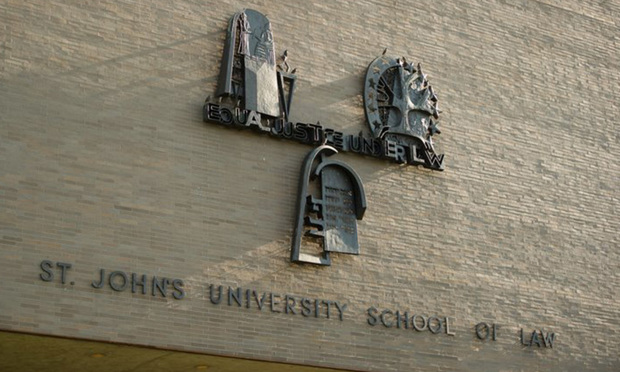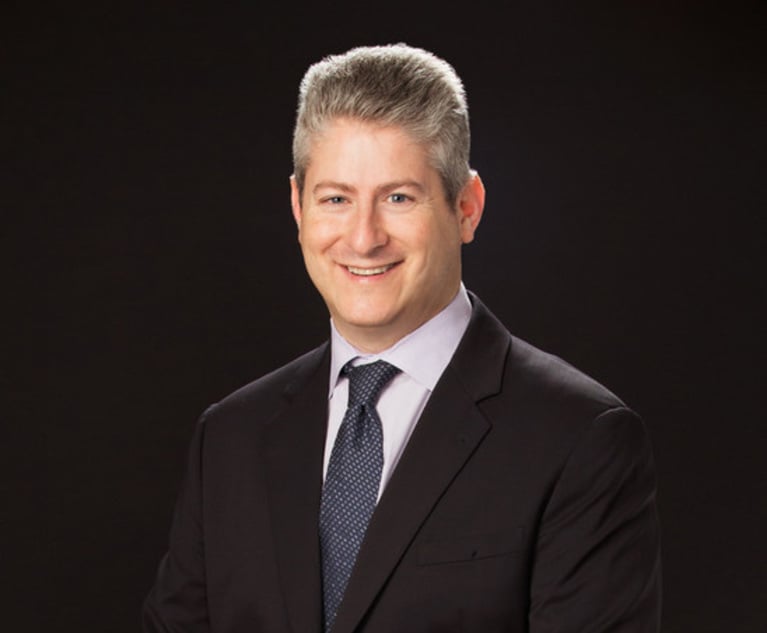Vast Majority of NY Law Schools Improve Bar Exam Passing Rates
For the second year in a row, graduates of NYU, Columbia and Cornell performed the best on the New York State bar exam with a 97.9 percent success rate for NYU graduates and the other two schools not far behind. But it was St. John's University that saw the most dramatic improvement from 76.5 percent in July 2016 to 89.2 percent in July 2017.
November 27, 2017 at 05:19 PM
6 minute read
 Photo courtesy of St. John's University School of Law
Photo courtesy of St. John's University School of Law
Graduates of 12 of the state's 15 law schools passed the New York bar exam in July 2017 at higher rates than their classmates did a year earlier.
For the second year in a row, graduates of NYU, Columbia and Cornell performed the best with a 97.9 percent success rate for NYU graduates and the other two schools not far behind. But it was St. John's University that saw the most dramatic improvement from 76.5 percent in July 2016 to 89.2 percent in July 2017.
It was the second year that New York administered the Uniform Bar Exam. It was one of 27 states to use the test, though a handful of other states have announced that they are switching to the UBE in the next two years.
 Michael Simons. Courtesy photo.
Michael Simons. Courtesy photo.“We and our students have adjusted to the elimination of the New York bar exam,” said St. John's Dean Michael Simons in an interview. “But in many ways this is the result of admissions decisions we made three years ago.”
Simons said the law school raised admissions standards, altered teaching methods and redid some of its testing. St. John's also increased support to students over the summer including “lots of pizza, bagels and coffee to keep them focused during the intense weeks of bar prep.”
Overall, 86 percent of first-time test takers made the grade, an improvement of 4 percentage points from July 2016. Some schools experienced large increases from 2015 to 2016 only to see the gains lost between 2016 and 2017.
Bar exam scores have been going up nationwide, said Judith Gundersen, president and CEO of the National Conference of Bar Examiners,
“I can tell you that anecdotally we're hearing that law schools that had a lot of students not passing are redoubling their efforts to get their students to pass the exams. So I think schools are doing a better job of preparing people,” she said in an interview.
“It's sort of like if everyone knew what the special sauce is everyone would have a really high pass rate,” Gundersen said. “In general across the country the trend has been improvement but not everyone has seen it. In general the improvement is very modest.”
The three law schools in New York that saw declines in the success rates of first-time test takers in July 2017 were Albany, Brooklyn and New York Law School. Albany Law School graduates had a passing rate of 71.3 percent, a decline of 11.4 percentage points from July 2016. At Brooklyn, 78.6 percent of graduates passed compared to 82.7 percent a year earlier and New York Law School saw 64.7 percent pass, a decline of 5.6 percentage points.
“Our faculty and administration are understandably concerned,” said New York Law School Dean and president Anthony W. Crowell. ”We are assessing the exam results and taking actions based on our findings.”
“We are extremely proud of our students who passed the bar exam, yet obviously disappointed and surprised that our pass rate is not higher for this particular exam,” Brooklyn Law School said in an email. “We know that it does not reflect the collective talents of our students or their preparedness for opportunities to practice in today's evolving legal profession.”
Syracuse Law School, which came in fifth of the 15 law schools, was proud of its passing rate of 91.6 percent.
“We are pleased that our graduates continue to excel on the New York State Bar Exam,” said Dean Craig M. Boise in an emailed statement. “For the second year in a row, our graduates have delivered the best results in decades, and we are proud of their accomplishment.”
Touro Law Center wasn't entirely pleased with the scores of its graduates.
“This year's bar pass rate results are 64.8 percent for all first-time test takers from Touro Law and 66.9 percent for May 2017 graduates. This represents a modest increase over last year's results. While the trend is encouraging, we realize we must continue to improve,” Dean Harry Ballan said.
Several schools cited initiatives underway to get more students to pass.
Hofstra University is offering “comprehensive programming beginning at orientation and continuing until the day they sit for the bar exam,” said Hofstra Dean A. Gail Prudenti.
“We have enhanced our academic support and bar support programs to work with students on the legal analysis and test-taking skills,” said CUNY Dean and professor of law Mary Lu Bilek.
Several schools also pointed out that their pro bono scholars who took the bar in February 2017 did extremely well and lamented the impact on the July bar passing rates.
“Over the last several years, the numbers of our students who sat for the February bar has been on the rise, and since the statewide Pro Bono Scholar program went into effect, 100 percent of those scholars passed the February bar,” Brooklyn Law School said in a statement.
“The UB School of Law is especially proud of its pro bono scholars who achieved a 100 percent pass rate on the February New York State Bar Exam,” Buffalo School of Law Dean Aviva Abramovsky said.
“Also, one item to note is that Pace Law has the largest number of pro bono scholars by far of any other NY law school. These students all take the February bar exam and have a very high pass rate,” said Elizabeth Rapuano, assistant dean of external relations.
Dean Simons of St. John's University sees getting more students to pass the bar as a moral imperative.
“Being able to pass the bar exam does not mean you'll be a great lawyer. But if you can't pass the bar exam you won't be a lawyer so in my view law schools have an obligation to prepare their students to meet the minimum qualifications for the bar and that includes being able to pass the bar exams,” he said.
This content has been archived. It is available through our partners, LexisNexis® and Bloomberg Law.
To view this content, please continue to their sites.
Not a Lexis Subscriber?
Subscribe Now
Not a Bloomberg Law Subscriber?
Subscribe Now
NOT FOR REPRINT
© 2025 ALM Global, LLC, All Rights Reserved. Request academic re-use from www.copyright.com. All other uses, submit a request to [email protected]. For more information visit Asset & Logo Licensing.
You Might Like
View All

Cooley Promotes NY Office Leader to Global Litigation Department Chair

NY Judge Resigns After Avoiding Jury Duty by Telling Court He Couldn't Be Impartial

Charlie Javice Jury Will Not See Her Texts About Elizabeth Holmes
Trending Stories
- 1Thursday Newspaper
- 2Public Notices/Calendars
- 3Judicial Ethics Opinion 24-117
- 4Rejuvenation of a Sharp Employer Non-Compete Tool: Delaware Supreme Court Reinvigorates the Employee Choice Doctrine
- 5Mastering Litigation in New York’s Commercial Division Part V, Leave It to the Experts: Expert Discovery in the New York Commercial Division
Who Got The Work
J. Brugh Lower of Gibbons has entered an appearance for industrial equipment supplier Devco Corporation in a pending trademark infringement lawsuit. The suit, accusing the defendant of selling knock-off Graco products, was filed Dec. 18 in New Jersey District Court by Rivkin Radler on behalf of Graco Inc. and Graco Minnesota. The case, assigned to U.S. District Judge Zahid N. Quraishi, is 3:24-cv-11294, Graco Inc. et al v. Devco Corporation.
Who Got The Work
Rebecca Maller-Stein and Kent A. Yalowitz of Arnold & Porter Kaye Scholer have entered their appearances for Hanaco Venture Capital and its executives, Lior Prosor and David Frankel, in a pending securities lawsuit. The action, filed on Dec. 24 in New York Southern District Court by Zell, Aron & Co. on behalf of Goldeneye Advisors, accuses the defendants of negligently and fraudulently managing the plaintiff's $1 million investment. The case, assigned to U.S. District Judge Vernon S. Broderick, is 1:24-cv-09918, Goldeneye Advisors, LLC v. Hanaco Venture Capital, Ltd. et al.
Who Got The Work
Attorneys from A&O Shearman has stepped in as defense counsel for Toronto-Dominion Bank and other defendants in a pending securities class action. The suit, filed Dec. 11 in New York Southern District Court by Bleichmar Fonti & Auld, accuses the defendants of concealing the bank's 'pervasive' deficiencies in regards to its compliance with the Bank Secrecy Act and the quality of its anti-money laundering controls. The case, assigned to U.S. District Judge Arun Subramanian, is 1:24-cv-09445, Gonzalez v. The Toronto-Dominion Bank et al.
Who Got The Work
Crown Castle International, a Pennsylvania company providing shared communications infrastructure, has turned to Luke D. Wolf of Gordon Rees Scully Mansukhani to fend off a pending breach-of-contract lawsuit. The court action, filed Nov. 25 in Michigan Eastern District Court by Hooper Hathaway PC on behalf of The Town Residences LLC, accuses Crown Castle of failing to transfer approximately $30,000 in utility payments from T-Mobile in breach of a roof-top lease and assignment agreement. The case, assigned to U.S. District Judge Susan K. Declercq, is 2:24-cv-13131, The Town Residences LLC v. T-Mobile US, Inc. et al.
Who Got The Work
Wilfred P. Coronato and Daniel M. Schwartz of McCarter & English have stepped in as defense counsel to Electrolux Home Products Inc. in a pending product liability lawsuit. The court action, filed Nov. 26 in New York Eastern District Court by Poulos Lopiccolo PC and Nagel Rice LLP on behalf of David Stern, alleges that the defendant's refrigerators’ drawers and shelving repeatedly break and fall apart within months after purchase. The case, assigned to U.S. District Judge Joan M. Azrack, is 2:24-cv-08204, Stern v. Electrolux Home Products, Inc.
Featured Firms
Law Offices of Gary Martin Hays & Associates, P.C.
(470) 294-1674
Law Offices of Mark E. Salomone
(857) 444-6468
Smith & Hassler
(713) 739-1250






